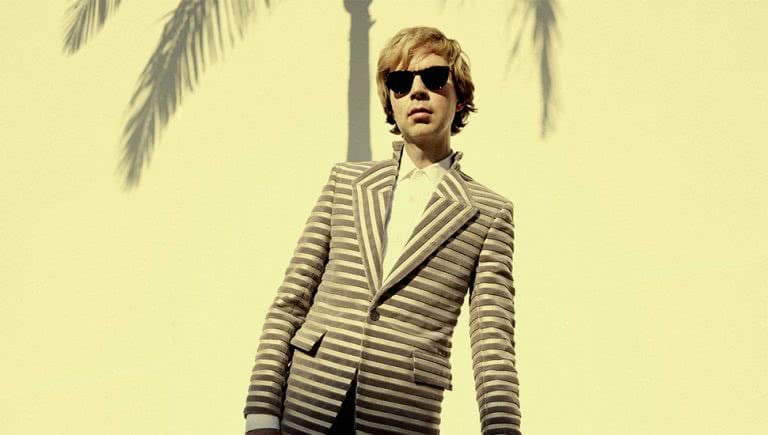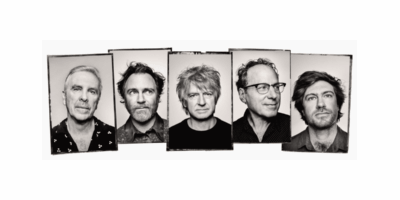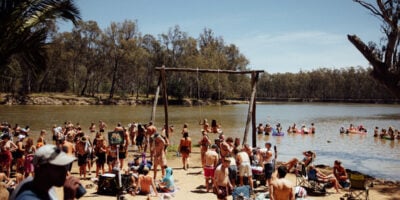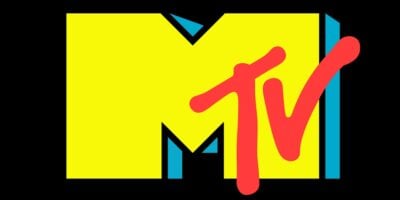For close to 30 years, the humble Beck Hansen has been tearing down the walls of musical evolution and rebuilding them as he sees fit.
Ever since he burst onto the mainstream with ‘Loser’ more than 25 years ago, Beck has proven he doesn’t do things in any conventional way. Further proving this with the magnificent Odelay, it felt as though every subsequent album that he created was an exercise in experimentation.
As time continued though, Beck dipped his toe into the world of more straightforward compositions as well, receiving widespread acclaim for the emotive Sea Change, and winning the Album of the Year Grammy for 2014’s Morning Phase.
While 2017’s Colors proved that his music will never be neatly placed into a box, the last few months saw the artist teasing a new record called Hyperspace. After sharing lead single ‘Saw Lightning’ earlier this year, the new record was only formally announced last month, with a surprise EP preceding its release.
Now, with Hyperspace finally being unleashed onto the world, fans have had a chance to listen to Beck at his most futuristic and exciting, seeing how the presence of iconic producer and songwriter Pharrell Williams has managed to inject a vibe the likes of which Beck fans have never experienced.
To celebrate, we recently had a chat with Beck to learn more about what went into the new record, what it was like working with the great Pharrell, and the inspiration behind this phenomenal new album.
Check out Beck’s ‘Uneventful Days’:

Love Music?
Get your daily dose of metal, rock, indie, pop, and everything else in between.
Tone Deaf: It feels like you’ve been pretty busy with touring the world since the release of Colors, how did Hyperspace come about? When did you find the time to work on a new record?
Beck: [Laughs]. Good question. Well, in between tours, you know. Just going to the studio and working on the songs. I’ve been spending time and working with Pharrell for a number of years and just sort of built that musical relationship over a period of time.
Last year we just really got moving on all the songs and he had some new ideas, and I did too. I came home from the Colors tour and we just went right into it. The whole thing happened pretty quickly.
TD: What sort of influence did Pharrell have on the direction that the album took?
Beck: Well, he works on a much more… I would say that when I make records I’m working with very modern recording techniques and modern sounds, but I’m also bringing a lot of older analogue sounds as well.
A lot of what he is doing is using a lot of the current programs in a very modern way. He is very in-tune with the moment, and embraces this kind of post-digital sound which I thought would be really interesting and a challenge to do something that was completely in that world.
Whereas a lot of my records are sort of bridging the gap between decades, the sound of Hyperspace is very much of the time we’re in now.
Check out Beck’s ‘Dark Places’:

TD: Hyperspace feels as though it continues the same upbeat, euphoric vibe that Colors had, but with much more of a dreamy pop and hip-hop influenced sound at times. Was there a conscious choice to make an album with such a sound, or did it serve as the next logical step?
Beck: Yeah, I was sort of following the lead with him and the songs just sort of have a life. They know what they want to feel like, and you’re just sort of into it to get it to where it already wants to be.
I think that when I was working on Colors, we were purposefully speeding up the songs. We wanted them to go over live and sound great at a festival, so we were going more towards faster tempo. This album, the songs are a bit slower and have a little bit more of a spell in them; more of a mood.
TD: If the songs for Colors were made to be performed live, then would you say that Hyperspace is more of an album to experience and to listen?
Beck: I think it’s a bit of both. I think that there’s definitely certain kinds of records that are streaming records. I think with the advent of streaming, you’re seeing the popularity of albums that are a bit more laidback. You hear it in rap music and pop, indie rock… It’s interesting to see.
There’s something about streaming that just lends itself to a certain kind of sound and mood… feeling the best. I think the mood of this record ends up, not really on purpose, but by just feeling the mood of the time and going more towards that tempo, and feeling.
There were a lot more aggressive songs on the records, and upbeat/uptempo songs, but we took them all off at the last minute because the record really… when we took them off, it became something entirely different that was much more interesting.
TD: So, will those songs make an appearance further down the line?
Beck: Yeah, sure. They’ll come out, definitely.
Check out Beck’s ‘Everlasting Nothing’:

TD: You’ve said that when it comes to making an album, you have a clear vision in your head of what you want it look and sound like. What had you envisioned with Hyperspace?
Beck: When I started working with Pharrell, I wanted to do something that was… I was thinking about the songs that he’s done with Jay-Z, Snoop Dog; he’s done some classic tracks.
The thing about him is when he comes in to work with you, he really does inhabit your world, and think about your music, and it really became a matter of us meeting each other in the middle.
I think he felt from the early sessions that we got together that I wanted to go towards something that was more of a singer/songwriter thing. So that’s how we ended up with songs like the ‘Everlasting Nothing’.
He was also excited to explore songs that had a blues sound, like ‘Saw Lightening’. I was very happy to let it take it’s course, find it’s own identity, and not really push it too hard in any direction.
So what ended up happening was a collaboration with us that was somewhat organic. It was a really interesting process getting to find that choreography together, bringing our song writing together.
Check out Beck’s ‘Stratosphere’:

TD: You also worked with a bunch of other names like Cole M.G.N., Sky Ferreira, and Chris Martin to name a few. What made you want to turn this into more of a collaborative affair than usual, or was that also a natural thing?
Beck: That is very much the way that Pharrell works. While we were working, he was talking about Post Malone or that we should get Miley Cyrus or Lil Uzi Vert, there was different names coming up. They were all people he was working with at the time.
It ultimately ended up with me calling up my friends and getting them to come out and sing on it with me. I’d like to do something much more collaborative, though. I feel like this record is, for the most part, myself and Pharrell.
I was hoping to get him to sing more on the record, but when he shows up here and there, it really is a bit of magic for me. As a fan, I get excited.
TD: Of course, you’d also collaborated with a lot of artists previously, such as the Record Club project.
Beck: Sure, yeah. That as well as the Song Reader album, I had a number of artists coming in.
TD: You’ve also said previously how you revisit ideas from the past when it comes to new records. Everything about this album sounds so futuristic and fresh, so did this record lend itself to revisiting some older ideas at all?
Beck: Yeah, pretty much for the new album. I had a couple of things like, there’s this song called ‘Stratosphere’, and I had those chords from quite a long time ago, and it just found its life in the song.
There’s a song I did with Greg Kurstin – who I did Colors with – and it sounds nothing like the ‘Colors’ song. It sounds much closer to what I was doing with Pharrell, so it was like this interesting crossover of working with the producer from the last record to this one, it’s sort of still inhabiting this world.
Check out Beck’s ‘Colors’:

TD: There’s a lot of lyrical references to nature and space throughout the record, was there anything specific that inspired the lyrical direction of this album?
Beck: I was thinking about this idea where, in a way, the way we choose to live our lives, whether it’s the pursuits you follow or the job you take. We put ourselves into some sort of pursuit in life that is the way in which we navigate the world.
It’s the lens or the filter in which we see the world, and feel with our life in the world, and it’s really fascinating to me.
There was a lot of talk in the last album which was kind of an exercise in pop, about the idea of escapism, and music escapism. It’s interesting, you know?
In a lot of ways it is. But, in other ways, I think whether you’re an author or an architect or an athlete — these are all different types of escapism in a sense of… it’s something that we can follow and lose ourselves into, and maybe use the vessel in which we grapple and wrestle with our problems, our past, our trauma, our future, our fears—all these elements of life.
So, on the record, each song is kind of encapsulates a kind of pursuit whether it’s religion, romance, drugs, whether you choose to be alone or withdrawn from the world. There’s been modalities of navigating things, and ultimately each of the pursuits are deeply human, and we all are human, and doing the best that we can.
We all have our own hyperspace button which helps us escape the impending asteroid of life smashing us to bits, and we are all looking for a way through and out. The album celebrates that everyday struggle and there’s something endearing and noble about that struggle.
Check out ‘Saw Lightning’ by Beck:



































